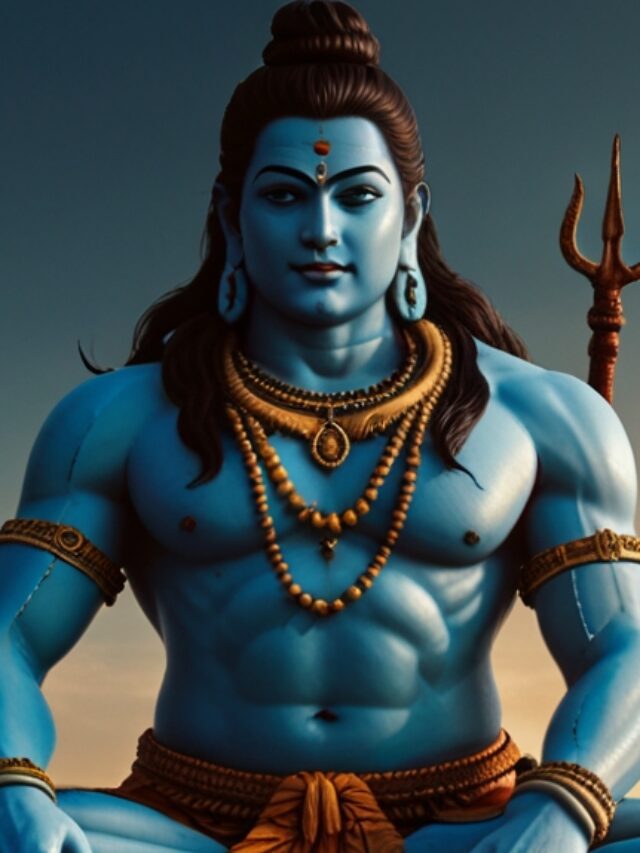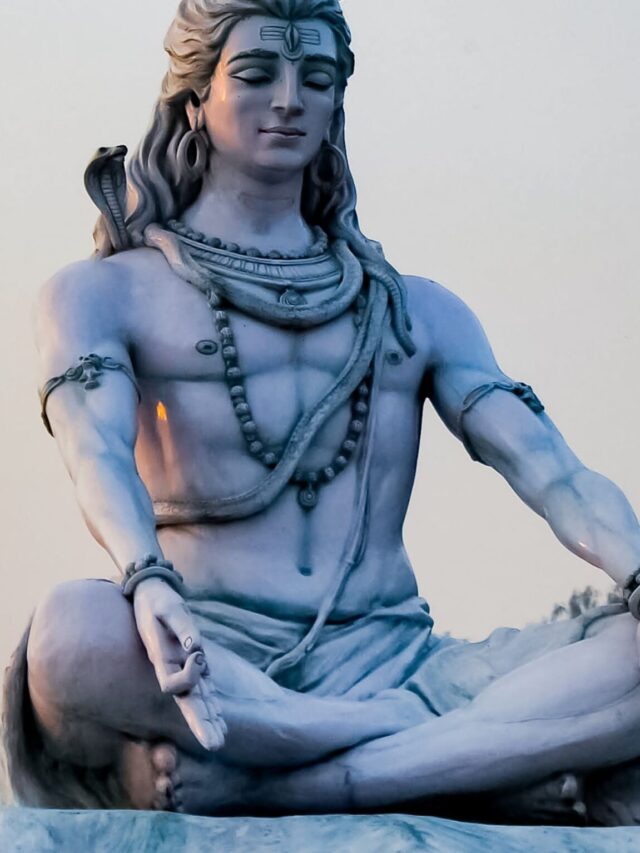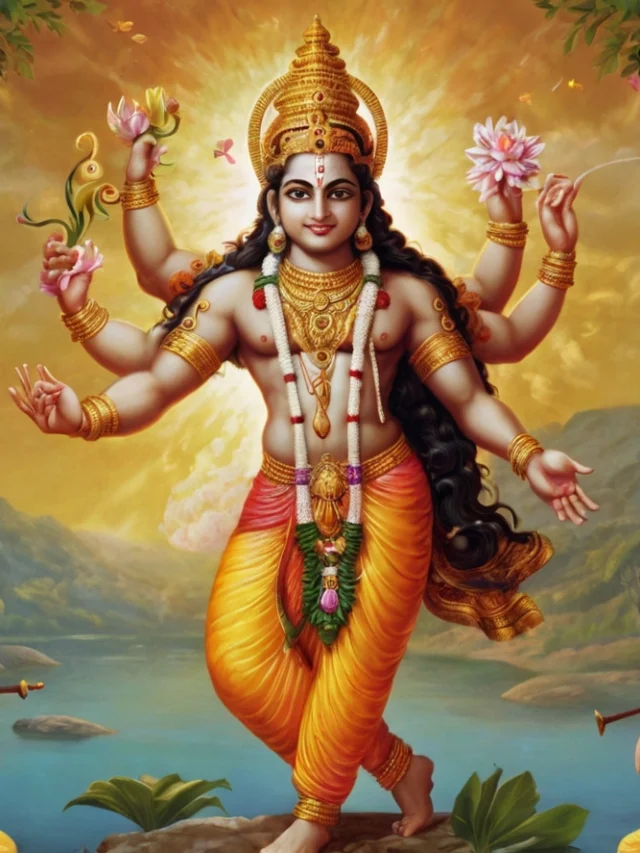The Exile of the Pandavas: Preparation for War in the Mahabharata.Explore the Pandavas’ 13-year exile in the Mahabharata, a period marked by trials, wisdom from sages, divine encounters, and crucial preparations for the epic Kurukshetra War. Discover their journey of resilience, righteousness, and strategic readiness.
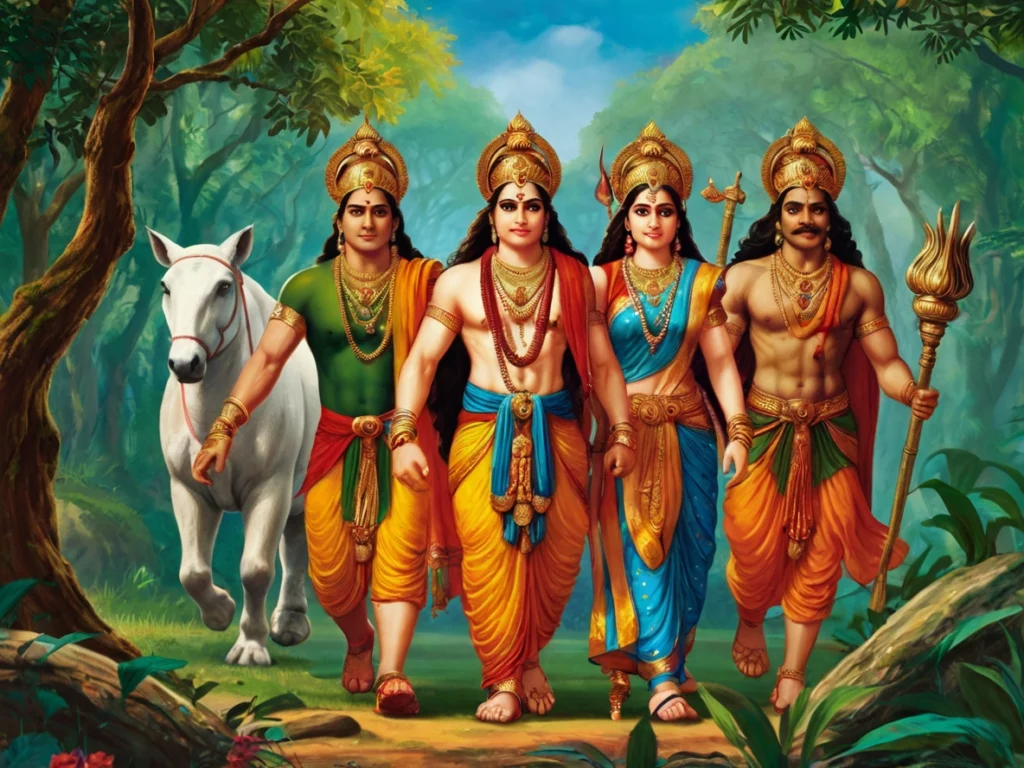
The Pandavas’ Years Of Exile
In the Indian epic, the Mahabharata, the Pandavas’ years of exile are a significant and transformative period in the narrative. The exile period, known as “Vanavasa” (forest dwelling), was a consequence of the dice game, where Yudhishthira, the eldest Pandava, gambled away his kingdom, wealth, and even his own freedom. The terms of the exile were that the Pandavas and their wife Draupadi would spend 12 years in the forest and the 13th year in incognito. If they were discovered during the incognito period, they would have to repeat the 12 years of exile again.
The 12 Years of Forest Exile (Vanavasa)
Life in the Forest: The Pandavas, along with Draupadi, spent their exile moving through various forests, facing hardships and living a life of asceticism. They stayed in the Kamyaka, Dvaita, and other forests, encountering sages, kings, and various challenges along the way.
Significant Events:
- Encounter with Sage Vyasa: The Pandavas met Vyasa, who consoled them and advised them on various spiritual and practical matters.
- Arjuna’s Pilgrimage: Arjuna, following Vyasa’s advice, undertook a pilgrimage to obtain divine weapons from the gods, which would later be crucial in the Kurukshetra war.
- Jayadratha’s Abduction of Draupadi: Jayadratha, the king of Sindhu, attempted to abduct Draupadi but was defeated and humiliated by the Pandavas.
- Meeting with Sage Markandeya: The sage narrated various stories and parables, providing wisdom and solace to the Pandavas during their hardships.
- Yaksha Prashna: At the end of the 12th year, Yudhishthira answered a series of philosophical questions posed by a Yaksha (a divine being) to save his brothers who had been rendered unconscious.
The 13th Year of Incognito (Agyatavas)
In the 13th year, the Pandavas had to live in disguise to avoid being recognized. They chose to spend this year in the kingdom of Matsya, ruled by King Virata.
Disguises:
- Yudhishthira: Took the name Kanka and served as a courtier and advisor to King Virata.
- Bhima: Became Ballava, a cook, and sometimes a wrestler in the court.
- Arjuna: Disguised as Brihannala, a eunuch who taught music and dance to the princess Uttara.
- Nakula: Took the name Granthika and worked in the royal stables.
- Sahadeva: Disguised as Tantipala and looked after the cows.
- Draupadi: Served as Sairandhri, the maid to Queen Sudeshna.
Significant Events:
- Keechaka’s Episode: Keechaka, the commander of Virata’s army, harassed Draupadi. Bhima, disguised as Ballava, killed Keechaka, ensuring Draupadi’s safety.
- Cattle Raid: Towards the end of the incognito period, the Kauravas attempted a cattle raid on Virata’s kingdom. Arjuna, revealing his true identity, single-handedly defeated the Kaurava forces, including the warriors Bhishma, Drona, Karna, and Duryodhana.
Return and Preparation for War
After successfully completing the 13 years of exile, the Pandavas revealed their identities and sought the return of their kingdom from the Kauravas. However, negotiations failed, leading to the declaration of the Kurukshetra War.
The years of exile were crucial for the Pandavas’ growth and preparation for the upcoming conflict. They gained valuable experiences, allies, and divine weapons, which played a vital role in their ultimate victory in the war. The exile period also highlighted their resilience, righteousness, and adherence to dharma (duty and moral order), which are central themes in the Mahabharata.
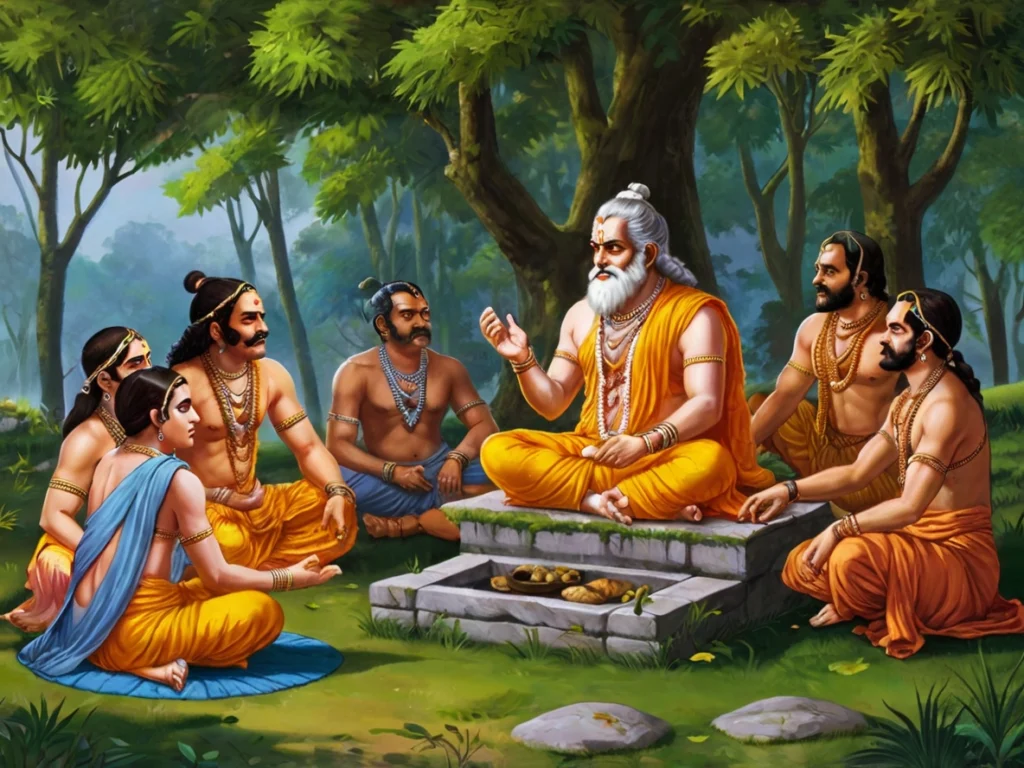
The Pandavas’ encounter with Sage Vyasa
The Pandavas’ encounter with Sage Vyasa during their exile is a significant moment in the Mahabharata, as Vyasa provided them with guidance and wisdom to help them endure their hardships.
Context of the Encounter
Sage Vyasa, the author of the Mahabharata and a revered figure in Hindu tradition, was not only a sage but also the grandfather of both the Pandavas and the Kauravas. During their exile, the Pandavas often faced despair, uncertainty, and the burden of their difficult circumstances. Vyasa’s visit brought much-needed solace and enlightenment.
Key Aspects of Vyasa’s Guidance
Spiritual Advice: Vyasa emphasized the importance of dharma (righteousness) and encouraged the Pandavas to remain steadfast in their adherence to moral and ethical principles. He reminded them that their sufferings were temporary and that their commitment to dharma would ultimately lead to their success and the restoration of justice.
Narration of Stories: To provide perspective and insight, Vyasa narrated various stories and parables. These stories illustrated the virtues of patience, perseverance, and faith in divine justice. One notable story was that of King Harishchandra, who endured immense suffering but remained steadfast in his truthfulness and righteousness.
Practical Guidance: Vyasa advised the Pandavas on practical matters, including strategies for survival in the forest and ways to maintain their physical and mental well-being. He also instructed them on the use of herbs and natural resources available in the forest.
Revelation of Divine Weapons: Vyasa revealed to Arjuna the importance of acquiring divine weapons for the future conflict. He guided Arjuna to undertake a pilgrimage and perform austerities to please the gods and obtain these powerful weapons. This advice proved crucial, as the weapons Arjuna acquired played a significant role in the Kurukshetra War.
Encouragement and Consolation: Vyasa’s presence itself was a source of great encouragement to the Pandavas. He consoled them, reinforcing their belief in their ultimate victory and the restoration of their kingdom. His words of wisdom and compassion uplifted their spirits and strengthened their resolve to face the challenges ahead.
Arjuna’s pilgrimage to obtain divine weapons
Arjuna’s pilgrimage to obtain divine weapons is a critical episode in the Mahabharata, as these weapons significantly contributed to the Pandavas’ victory in the Kurukshetra War. This journey is marked by Arjuna’s devotion, bravery, and the blessings he received from various deities.
Context and Motivation
During the Pandavas’ exile, Sage Vyasa advised them to prepare for the inevitable conflict with the Kauravas by acquiring divine weapons. Vyasa specifically instructed Arjuna to undertake a pilgrimage to seek the favor of the gods and obtain these powerful weapons, which would give the Pandavas an edge in the war.
Key Events of Arjuna’s Pilgrimage
Meditation and Austerities: Arjuna started his pilgrimage by performing severe penances and meditations to please the gods. He meditated in the Himalayas, where he undertook rigorous austerities to draw the attention of Lord Shiva.
Encounter with Lord Shiva: One of the most significant events during Arjuna’s pilgrimage was his encounter with Lord Shiva. Disguised as a hunter, Lord Shiva tested Arjuna’s skills and determination by engaging him in combat. Impressed by Arjuna’s prowess and devotion, Shiva revealed his true form and bestowed upon him the Pashupatastra, one of the most powerful celestial weapons.
Blessings from Other Deities: Following his encounter with Lord Shiva, Arjuna continued his journey to the heavens, where he met and received blessings from other deities:
- Indra: Arjuna’s father, the king of the gods, welcomed him in Indraloka (heaven) and granted him the Vajra (thunderbolt) and other celestial weapons. Indra also arranged for Arjuna to be trained by the Gandharvas (celestial musicians and warriors) and other divine beings.
- Varuna: The god of the oceans granted Arjuna the Varunastra, a weapon with the power to unleash floods and control water.
- Yama: The god of death and justice gave Arjuna the Yamapasha, a noose that could bind and control enemies.
- Kubera: The god of wealth gifted Arjuna with various treasures and weapons.
Training and Knowledge: During his time in the heavens, Arjuna not only acquired divine weapons but also received training in their use. He learned the secrets of deploying and retracting these weapons, which required specific mantras and invocations.
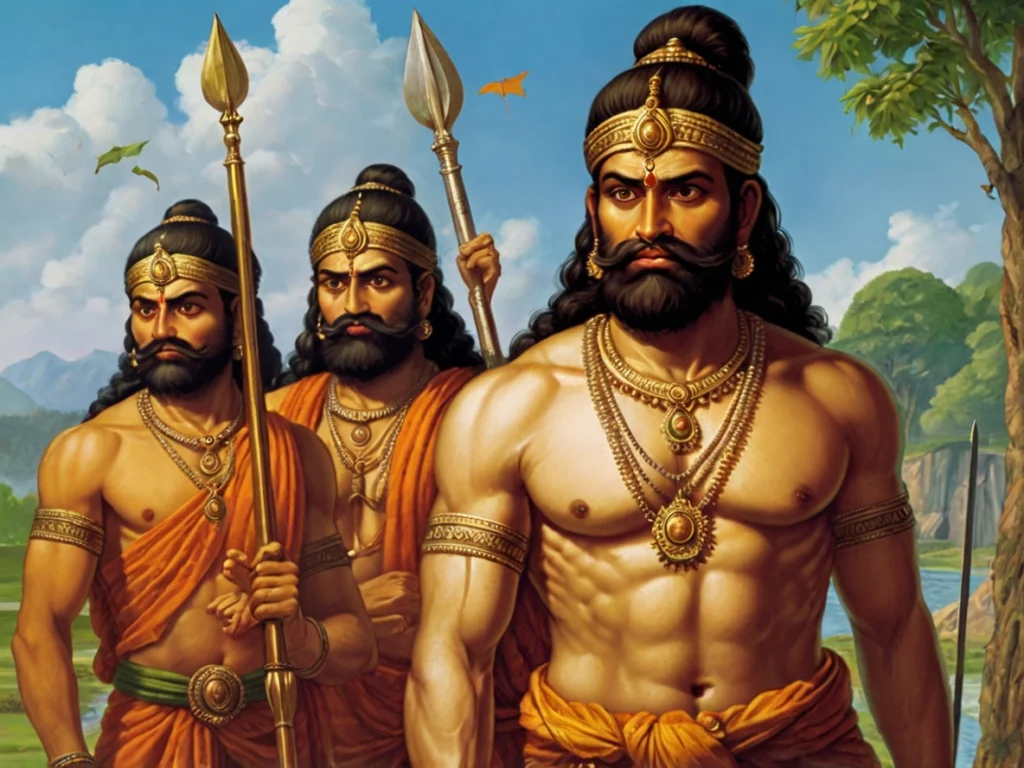
Jayadratha’s attempted abduction of Draupadi
The episode of Jayadratha’s attempted abduction of Draupadi is a dramatic and significant event during the Pandavas’ exile in the Mahabharata. It highlights the themes of bravery, loyalty, and the protection of honor.
Context
During the Pandavas’ twelve-year exile in the forest, they lived with their wife, Draupadi. Jayadratha, the king of Sindhu and brother-in-law of Duryodhana, came across Draupadi while she was alone in the forest. Captivated by her beauty, he decided to abduct her, leading to a fierce confrontation with the Pandavas.
The Abduction Attempt
Jayadratha’s Encounter with Draupadi: Jayadratha saw Draupadi near the hermitage where the Pandavas were staying. Overcome by desire, he approached her with his intentions. Despite her warnings and attempts to dissuade him, Jayadratha forcefully took Draupadi and placed her in his chariot.
Draupadi’s Resistance: Throughout the abduction, Draupadi resisted Jayadratha, scolding him for his cowardice and warning him of the consequences of his actions. She showed remarkable courage and presence of mind, hoping that her husbands would come to her rescue.
The Pandavas’ Response
Discovery of the Abduction: When the Pandavas returned to their hermitage and discovered Draupadi missing, they were filled with rage and concern. A sage informed them about Jayadratha’s actions, and they immediately set out to rescue her.
The Pursuit: The Pandavas, led by Bhima and Arjuna, quickly pursued Jayadratha. Their determination and speed were unmatched, and they soon caught up with Jayadratha’s chariot.
The Battle: A fierce battle ensued between the Pandavas and Jayadratha’s forces. Arjuna, with his unparalleled archery skills, and Bhima, with his immense strength, decimated Jayadratha’s army. Jayadratha was no match for the combined might of the Pandavas.
Jayadratha’s Defeat and Humiliation
Capture of Jayadratha: Bhima captured Jayadratha and brought him before Draupadi. Draupadi, still seething with anger, demanded justice for the insult and trauma she had endured.
Punishment and Humiliation: Bhima, with the consent of his brothers, decided to humiliate Jayadratha rather than kill him, as per Draupadi’s wish. They shaved his head, leaving five tufts of hair, and released him. This act was meant to disgrace Jayadratha and serve as a warning to others about the consequences of such actions.
Jayadratha’s Vow: Humiliated and seeking revenge, Jayadratha performed severe penances to please Lord Shiva. Pleased with his devotion, Shiva granted him a boon that he could defeat the Pandavas (except Arjuna) for one day in battle. This boon played a significant role later during the Kurukshetra War, leading to the death of Arjuna’s son, Abhimanyu.
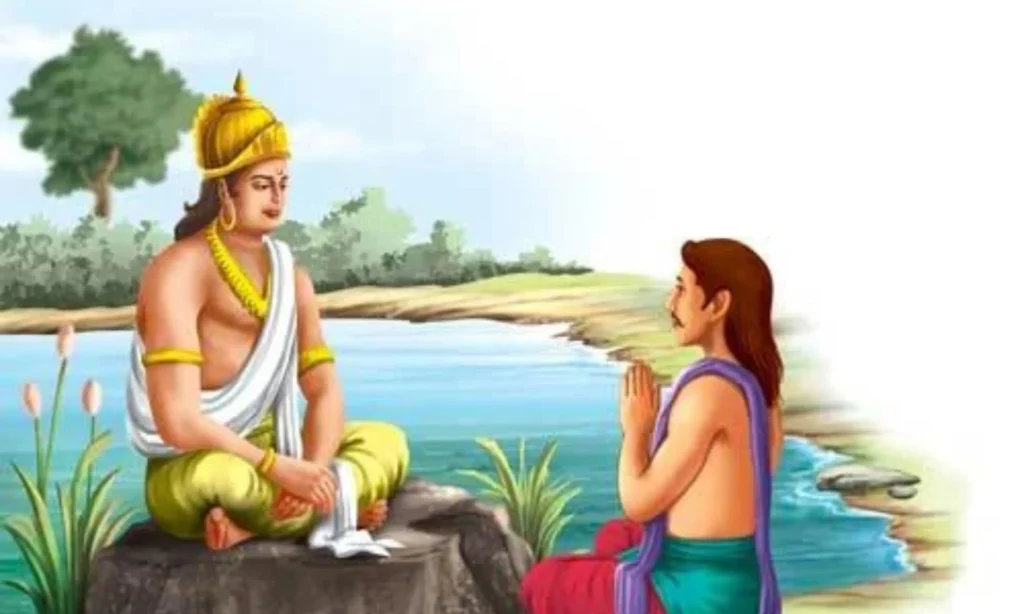
The Yaksha Prashna, also known as the Yaksha’s Questions
The Yaksha Prashna, also known as the “Yaksha’s Questions,” is one of the most profound and philosophical episodes in the Mahabharata. It occurs towards the end of the Pandavas’ 12-year exile in the forest. In this episode, Yudhishthira, the eldest Pandava, demonstrates his wisdom and commitment to dharma (righteousness) by answering a series of questions posed by a Yaksha, a divine being.
Context
After spending almost twelve years in exile, the Pandavas were preparing for their incognito year. One day, while they were living in the Kamyaka forest, they found themselves in dire need of water. Bhima, Arjuna, Nakula, and Sahadeva went in search of water but did not return. Finally, Yudhishthira himself went to look for his brothers and encountered a mysterious lake guarded by a Yaksha.
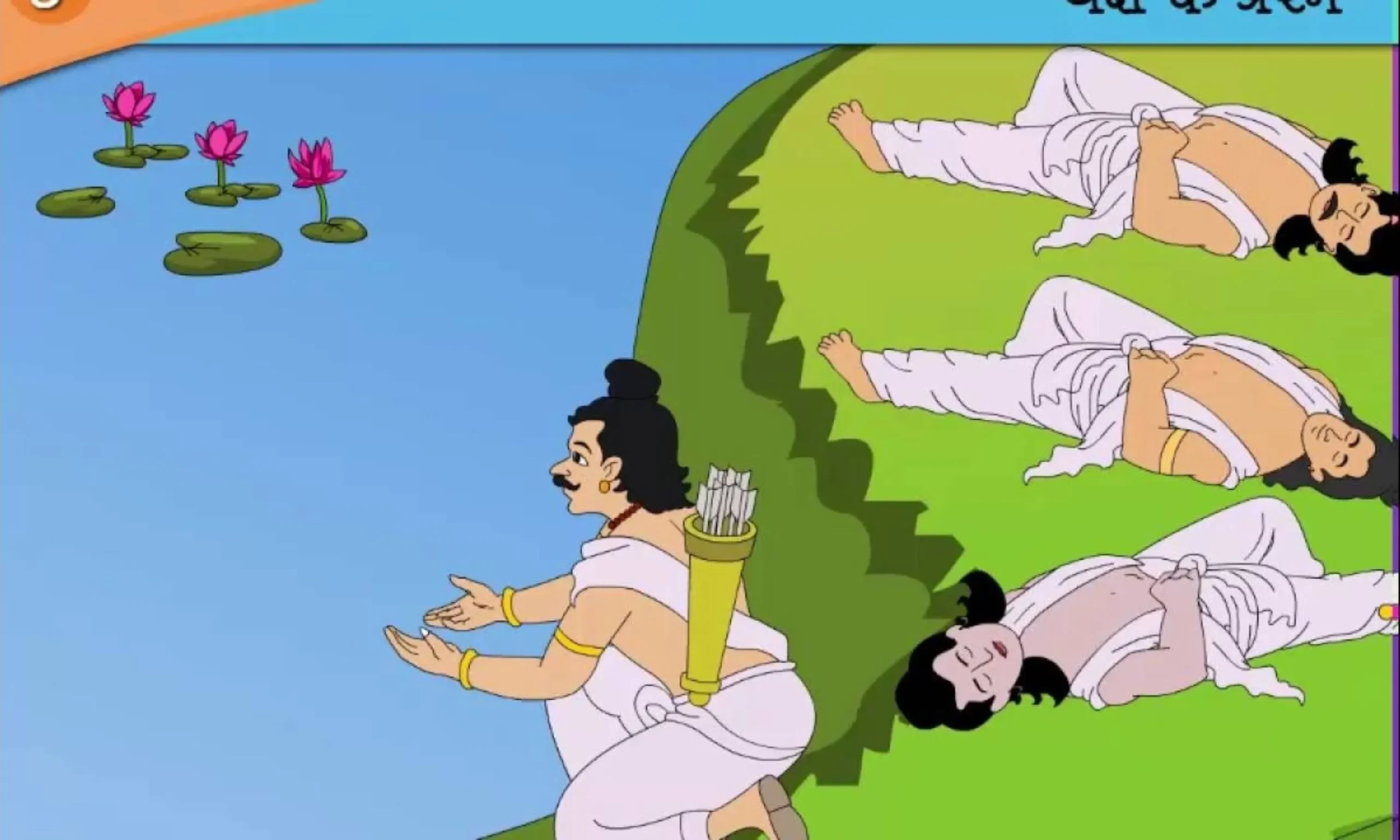 The Yaksha Prashna, also known as the Yaksha’s Questions
The Yaksha Prashna, also known as the Yaksha’s Questions
The Yaksha’s Challenge
When Yudhishthira arrived at the lake, the Yaksha warned him not to drink the water before answering his questions. Yudhishthira, seeing his brothers lying unconscious near the lake, understood the gravity of the situation and agreed to answer the Yaksha’s questions. The Yaksha then posed a series of questions that tested Yudhishthira’s knowledge, wisdom, and understanding of dharma.
The Questions and Answers
The questions asked by the Yaksha covered a wide range of topics, including ethics, philosophy, and practical wisdom. Some of the notable questions and Yudhishthira’s answers are as follows:
Yaksha: What is more valuable than gold? Yudhishthira: Knowledge.
Yaksha: What is the greatest wonder? Yudhishthira: Day after day, countless people die. Yet the living wish to live forever. This is the greatest wonder.
Yaksha: What is the path? Yudhishthira: The path of dharma, as followed by the righteous, is the path.
Yaksha: What is the greatest treasure? Yudhishthira: Contentment.
Yaksha: Who is truly happy? Yudhishthira: He who has no debts is truly happy.
Yaksha: What is the most significant duty? Yudhishthira: The duty of doing good to others.
Yaksha: What is faster than the wind? Yudhishthira: The mind.

